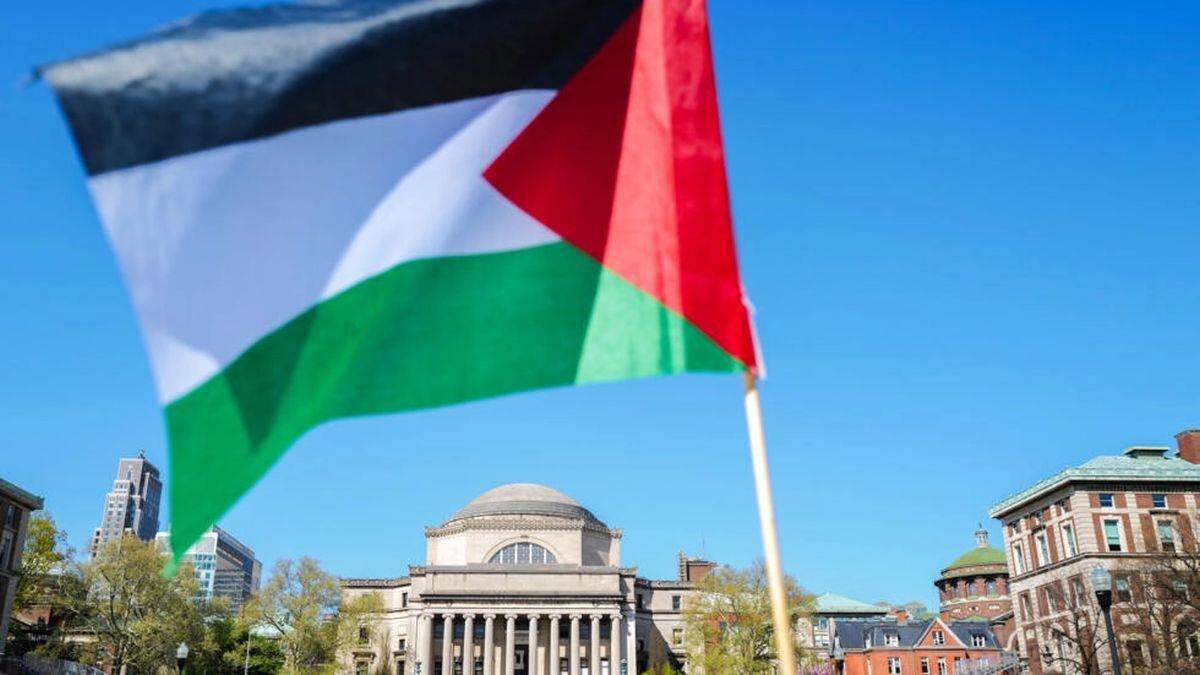The courtyard of Columbia University’s main campus in New York became the epicenter of the pro-Palestinian protests that have spread among young students in the United States. Multicolored campaign stands are combined with slogans that stop the fire on the fringes of Gaza, in a movement that has escalated to provoke confrontations with the forces of the order and sparked the debate on security and freedom of expression in the centers of College education.
TO LOOK: What does the US million-dollar military aid package for Ukraine contain?
According to The New York Times, more than 400 protesters have been arrested since Friday the 19th across the country, when the arrest of Columbia University students fueled student activism in dozens of university centers, including Harvard, Yale, MIT and others of equal prestige.
On Wednesday the 24th alone, more than 120 people were arrested at the University of Southern California (USC) and the University of Texas (UT). The clashes between police and students were recorded in videos shared by students on social media.
“This didn’t happen overnight,” Carlo Ángeles, a Peruvian studying for a master’s degree in Public Administration at Columbia, told El Comercio. Protests on his campus, he recalls, have been registered since the end of last year.
The situation worsened last week when the Columbia administration decided to remove people who were camping, alleging, among other reasons, that they were violating university policies, but also that there was language that did not respect other communities in the student body.
“The crisis led the Columbia administration to decide to remove the protesters, but ultimately this only increased tensions at the university,” says Ángeles.
The Peruvian student considers that, regardless of whether he is for or against the protesters, the general feeling of the university community is that absolutely all types of violence against any community must be rejected.
“If some communities indicated that they felt threatened by some songs or others, this is something that clearly should not be allowed in the university space. But in the same way, it is also important to emphasize that it is a right to be able to express oneself and many members of the university community believe that this right should prevail, as long as it is maintained peacefully”, he states.
“The university administration has an obligation to make all students feel safe, absolutely everyone, both those who protest and those who do not”, he emphasizes.
5th day of the Gaza Solidarity Camp @Columbia pic.twitter.com/dsrBLkaWHn
– Mukta Joshi (@mukta_jo) April 22, 2024
Colombian Foreign Minister Nemat Shafik set midnight on Tuesday as the deadline to end the protest, but protesters vowed not to tone it down. One of the main demands of the protesting students is that Columbia University withdraw investments from companies that, according to them, are involved in the war between Israel and Hamas.
Ángeles highlights that the protesting group is now in the courtyard of the main campus, the space where graduations take place. “This location clearly allows protesters to use this protest and the specific act of camping as part of a platform to get their message across.”
Visiting Colombia, House Speaker Mike Johnson, a Republican, suggested that if the protests were not contained soon it would be “an appropriate time for the National Guard to intervene.”
Ángeles says that as part of security measures, Columbia has implemented mechanisms at each door to ensure that everyone who enters is only a student. There is also the presence of security forces.
“On Wednesday there were helicopters, possibly from news channels, flying over the university. Ultimately, the university rector decided not to continue with the eviction”, says the Peruvian, who highlights that the impact on the university’s functioning has been concentrated on the decision that classes can be taught at home.
“Those who feel safe can go in person and those who don’t can go virtually. What’s not entirely clear is what graduation will look like, as the camp has decided to set up a very short distance from the main stage. The format and where it will take place are still being evaluated. Final exams may also be carried out in a hybrid format, when they should normally be in person,” he comments.

The impact of the protests outside Colombia is also uncertain. Some universities have had to carry out temporary closures to avoid any potential acts of conflict.
Source: Elcomercio
I am Jack Morton and I work in 24 News Recorder. I mostly cover world news and I have also authored 24 news recorder. I find this work highly interesting and it allows me to keep up with current events happening around the world.

:quality(75)/cloudfront-us-east-1.images.arcpublishing.com/elcomercio/O3V64FOKMZCJFK4HSDKLCUJZT4.jpg)





